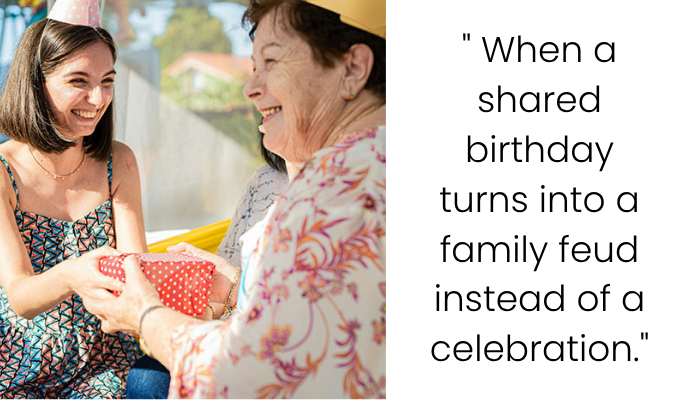Teen Called “Heartless” For Admitting They Wish They Didn’t Share A Birthday With Grandma
OP (17F) shares a birthday with her grandmother on her dad’s side, which has always meant joint celebrations. As a kid, she didn’t mind much — but after turning 8, she stopped getting any real say in how the day went. Now, every year it’s whatever Grandma wants: the food, the activities, the guest list, the venue — everything revolves around her preferences. The family gathers at Grandma’s house, cooks, and chats all day. OP says her only real contribution is choosing a few dinner dishes and the cake flavor.
But being a teen, OP naturally wants to spend part of her birthday with friends, maybe go out or at least invite a few over. Every time she asks, though, her parents shut her down, saying she should spend the day with her “twin,” meaning her grandmother. Hosting at her own house was also rejected — apparently Grandma doesn’t like their couches (yep, really).
This year, during the shared birthday party, OP stepped outside to vent to her sister, saying she wished she didn’t have to share a birthday so she could have her own celebration. Unfortunately, her aunt overheard, told everyone inside, and chaos erupted. The family accused her of being ungrateful, heartless, and disrespectful — that she broke Grandma’s heart. Now everyone’s being cold and distant with her.
She knows it wasn’t the smartest move to vent out loud during the event, but she also feels like she’s been completely dismissed for years. All she wants is one chance to celebrate her own day in her own way. So she asks: AITA?
It’s natural for a teen to want to celebrate their birthday with some friends

But this 17YO isn’t allowed to… Instead, her grandma gets to plan their combined party every year
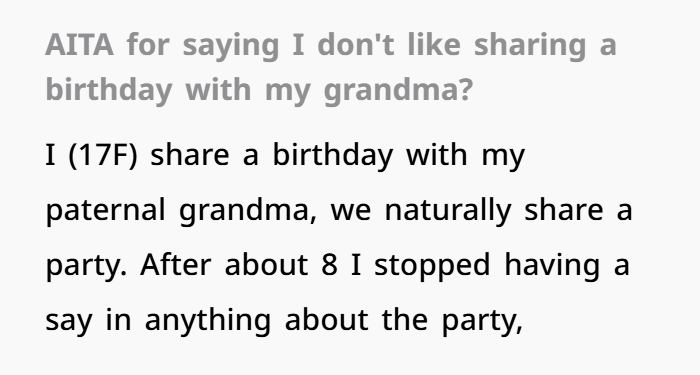
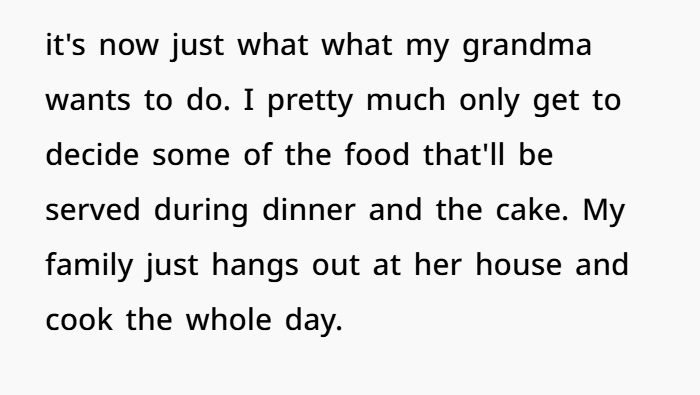
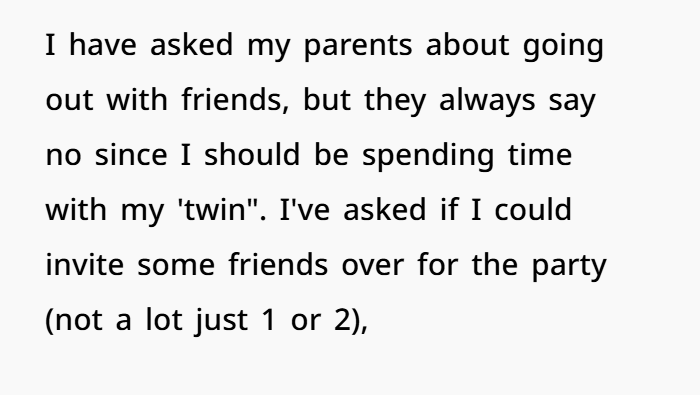
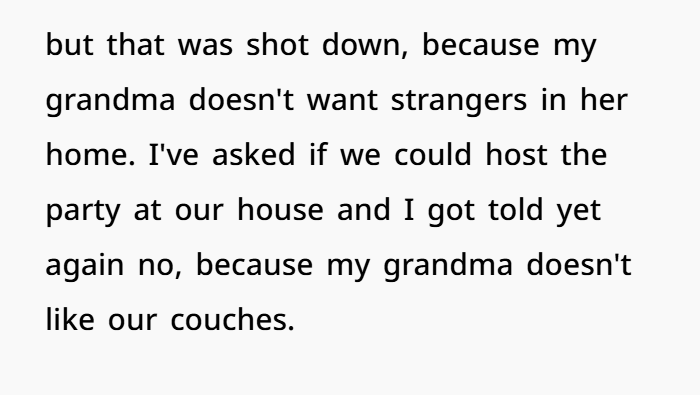
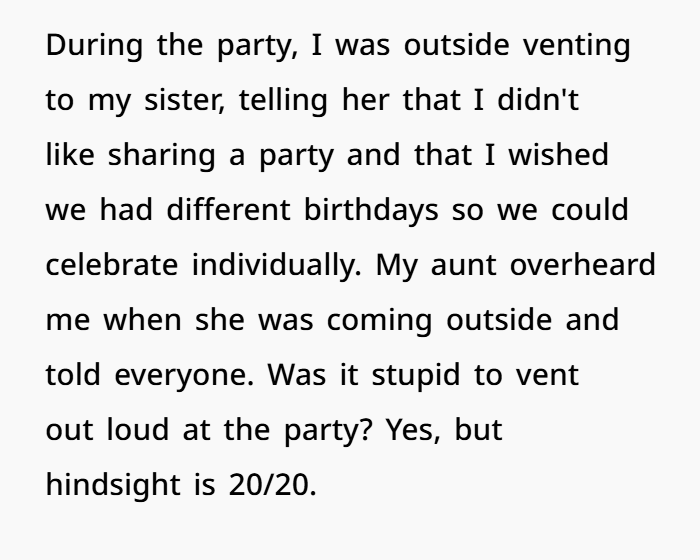

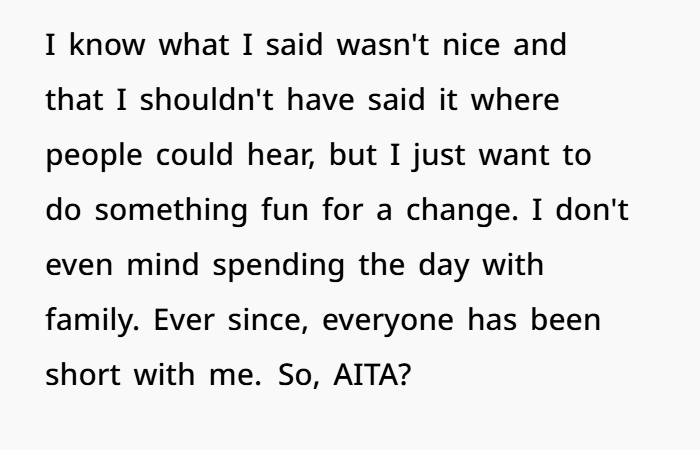
So, let’s unpack this. Because honestly, this story hits on something deeper than just birthday drama — it’s about autonomy, family expectations, and that tricky guilt that comes with saying “I want something for myself.”
1. Growing up with shared birthdays
When you’re little, sharing a birthday can be cute. Matching cakes, shared candles, and that warm “family togetherness” vibe. But as you grow up, birthdays start to mean something more personal. They’re milestones — markers of identity and independence.
At 17, OP isn’t a kid anymore. She’s right on the edge of adulthood, and part of that transition involves wanting to make your own choices. Research on family psychology (and even twin studies) shows that as people age, the desire for individuality increases sharply in adolescence. It’s not rebellion — it’s natural self‑development.
But OP’s family seems stuck in an older mindset where family traditions matter more than personal wishes. That kind of dynamic often leads to resentment — especially when the younger family member isn’t given any real say.
OP doesn’t even dislike celebrating with Grandma; she just wants a slice of her day that’s hers. That’s not selfish. That’s healthy.
2. The guilt trip and “you broke Grandma’s heart”
The family’s reaction says a lot about their emotional patterns. Words like “ungrateful” and “you broke her heart” are classic examples of emotional manipulation, often unintentional but still harmful.
In psychology, guilt tripping is a control tactic — it makes someone feel bad for wanting something reasonable. In this case, OP’s perfectly normal desire for autonomy got twisted into a moral failing. Instead of empathy, she got shame.
When people say things like, “It’s a blessing to share your birthday,” what they really mean is, “We like it this way, so stop complaining.” It dismisses her perspective and forces her into silence.
Her grandma might have felt hurt in the moment, sure. But a mature adult — especially a grandmother — could also have said, “I understand you want your own time. Maybe we can split the day next year.” Instead, everyone piled on the guilt, which is emotionally unfair to a 17‑year‑old who just wanted a little space.
3. Boundaries aren’t disrespect
Here’s a key thing many families misunderstand: setting boundaries isn’t disrespectful. It’s communication.
OP didn’t yell at anyone. She didn’t refuse to participate. She just expressed frustration privately to her sister. Yes, it happened during the event, but she wasn’t announcing it over the mic or ruining the party. It was just venting. Everyone vents — especially teens who feel unheard.
In boundary‑setting terms, what OP is asking for is extremely mild:
- Either to have a separate friend gathering, or
- To have a say in where and how the celebration happens.
That’s not rejection of family — that’s just balance. Families that can’t tolerate any independence from younger members often struggle later when those same members move out and go low‑contact. Because eventually, people get tired of being guilted for wanting normal autonomy.
4. Cultural and generational gaps
There’s also a possible generational angle here. For many older relatives, shared family events represent unity and tradition. But for Gen Z (like OP), birthdays are personal experiences — about celebrating who you are. The difference can feel like a clash between collectivist and individualist thinking.
Grandma’s dislike of OP’s house “because of the couches” is another clue: it’s about control, not practicality. Grandma wants the event her way, at her place, where she’s the center of attention. It’s not about the celebration — it’s about power.
And when OP’s parents back Grandma instead of their daughter, it sends a message: “Your comfort matters less than hers.” That’s a recipe for long‑term resentment.
5. What OP could do next
Alright, so where does she go from here? Because clearly, speaking up mid‑party didn’t go over well (understandably).
Here’s what she can try:
- Talk to her parents calmly afterward. Not about guilt, but about feelings. “I love Grandma, but I’ve felt left out of my own birthday for years. I’d really appreciate being able to plan something that feels like me.”
- Offer a compromise. Like splitting the day — morning/lunch with Grandma, evening out with friends. Or celebrating on the weekend before or after.
- Emphasize that it’s not rejection. “I’m not saying I don’t want to celebrate with her. I just want to celebrate in a way that’s meaningful to me too.”
- Create her own tradition. If the family won’t budge, she can start her own small thing: a post‑birthday hangout, dinner, or solo ritual that honors her day. Independence sometimes starts quietly.
If the family continues to treat her as “ungrateful,” she might need to accept that they don’t see her perspective yet. That happens. Sometimes people only get it once you’re older and not obligated to participate.

6. Why she’s not the asshole
- She didn’t insult her grandma; she vented frustration privately.
- She’s been excluded from her own birthday planning for nearly a decade.
- She made multiple respectful requests (friends over, changing venues, etc.), all denied.
- The family overreacted and guilted her for normal feelings.
That’s not being an asshole — that’s being human.
If anything, this is a case of toxic family dynamics where one person’s preferences dominate and everyone else has to fall in line. Her desire for change is valid.
7. The emotional truth
At its core, this story isn’t about a birthday at all. It’s about being seen. OP wants recognition that she’s her own person, not just “the kid who happens to share Grandma’s special day.” She’s asking for emotional space — for her family to see her growing up and wanting something different.
When families ignore those signals, they unintentionally teach kids that their voices don’t matter. That’s how quiet resentment turns into emotional distance later in life.
So no, she’s not ungrateful — she’s just done being invisible at her own party.
“Probably get grounded for life”: the teen gave a lot more info later on
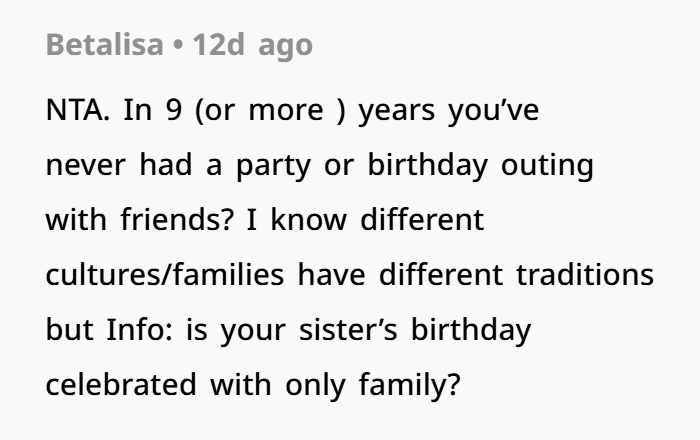
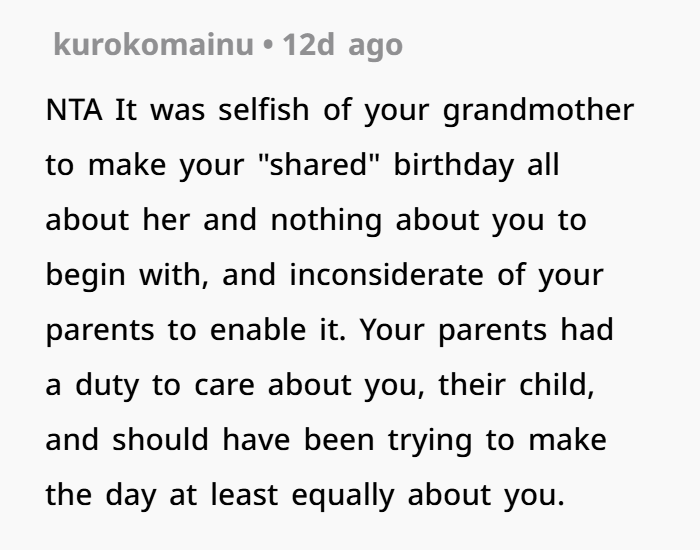
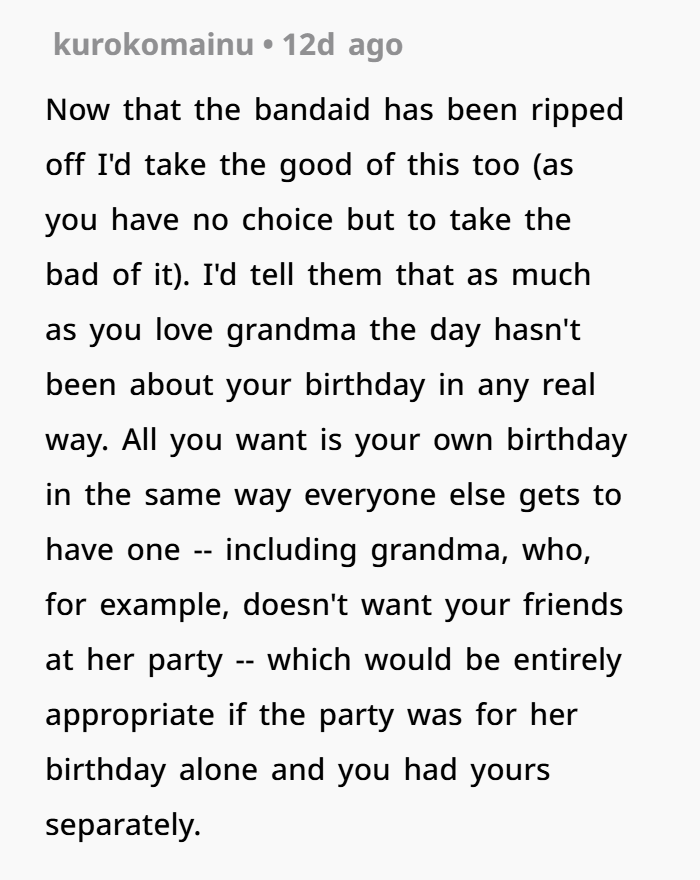
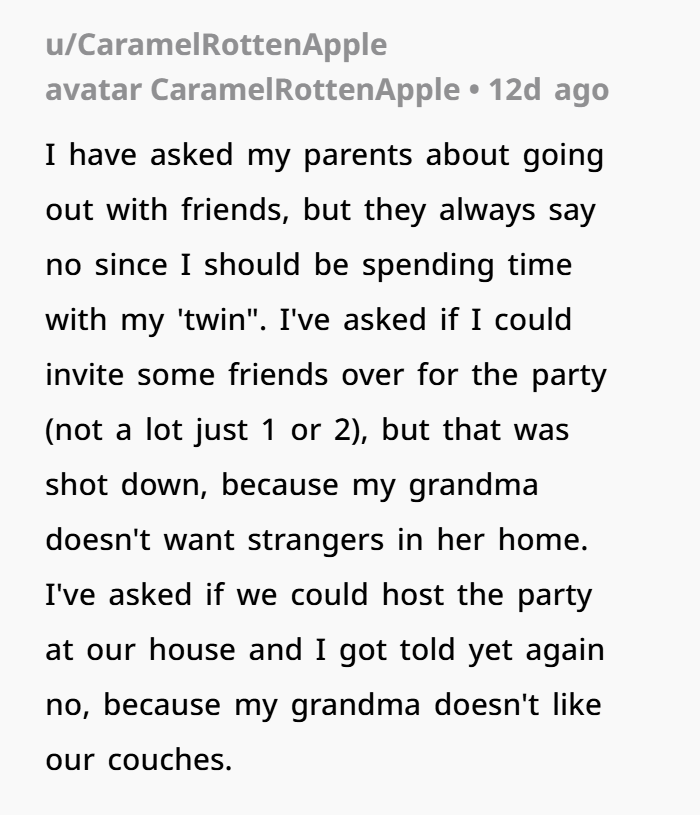
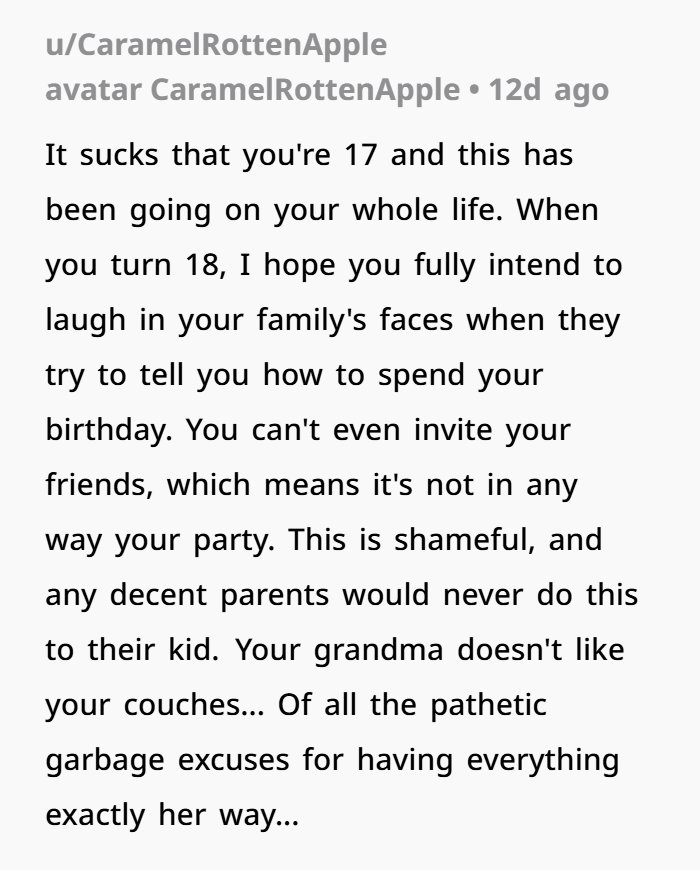

She didn’t ruin anything. She didn’t disrespect anyone. She simply voiced what many teens (and honestly, adults) feel when their families cling too tightly to old traditions.
The right move would’ve been for the adults to say, “Hey, let’s talk about this later — we hear you.” Instead, they punished her for honesty.
Hopefully, in time, her family will realize that wanting your own birthday isn’t selfish — it’s just part of growing up. And when that happens, maybe next year she’ll finally get to blow out candles at a party that feels like hers.

